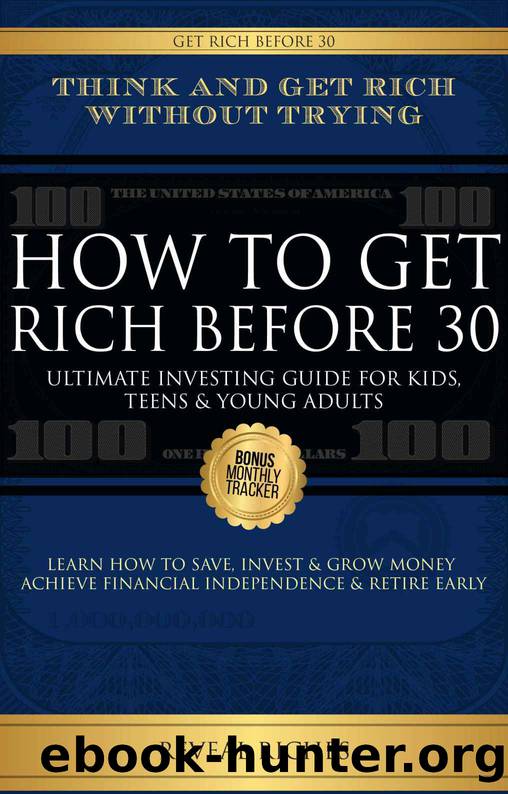How to Get Rich Before 30: Ultimate Investing Guide For Kids, Teens & Young Adults, Learn How To Save, Invest & Grow Money Achieve Financial Independence & Retire Early by Reveal Riches

Author:Reveal Riches [Riches, Reveal]
Language: eng
Format: epub
Publisher: Get Rich Books
Published: 2023-03-19T23:00:00+00:00
The âNoâ Budget
The 'no' budgeting method is an effective alternative to traditional budgeting approaches in that it relies on spending only the money you have. This means that individuals should avoid using credit cards or taking out loans, as these are forms of debt and can create many financial problems.
Rather than tracking every dollar spent and allocating funds to specific categories, this method focuses on simply saying no to all unnecessary purchases and living within one's means. This approach works well for people who have difficulty sticking to a budget or need to reduce their debts and increase their savings quickly.
An individual practicing the 'no' budgeting system should first identify their essential expenses like rent/mortgage payments, utilities, groceries, etc., then use any remaining income left over to pay off debt or add to savings. They should also consider setting up automatic payments for recurring bills to ensure that necessary payments are made monthly without worrying about missing deadlines.
This budgeter should also consider reducing overall costs, such as shopping around for better deals (e.g., cheaper energy providers) or lower-cost alternatives (e.g., generic brands instead of name-brand items). Additionally, they can learn which services offer discounts for cash payment (e.g., medical offices and auto mechanics) and prioritize these when possible to save money.
The 'no' budgeting system can be complex at first since it requires strong discipline and willpower to stay within one's means each month; however, with practice, individuals can build healthy habits that allow them to remain financially secure and reduce their liabilities.
An example of the 'no' budgeting system can be seen in a person who earns $3,000 per month. They should identify their essential expenses, such as rent/mortgage payments, utilities, groceries, etc., and allocate at least 50% ($1,500) to those. The remaining 50% should then be used for debt repayment and savings.
Download
This site does not store any files on its server. We only index and link to content provided by other sites. Please contact the content providers to delete copyright contents if any and email us, we'll remove relevant links or contents immediately.
Nudge - Improving Decisions about Health, Wealth, and Happiness by Thaler Sunstein(6650)
Deep Work by Cal Newport(5516)
Principles: Life and Work by Ray Dalio(5342)
The Doodle Revolution by Sunni Brown(4058)
Factfulness: Ten Reasons We're Wrong About the World – and Why Things Are Better Than You Think by Hans Rosling(4035)
Thinking in Bets by Annie Duke(3545)
Eat That Frog! by Brian Tracy(3534)
Writing Your Dissertation in Fifteen Minutes a Day by Joan Bolker(3304)
Hyperfocus by Chris Bailey(3292)
Visual Intelligence by Amy E. Herman(3289)
How to Win Friends and Influence People in the Digital Age by Dale Carnegie & Associates(2840)
How to win friends and influence people by Dale Carnegie(2835)
Schaum's Quick Guide to Writing Great Short Stories by Margaret Lucke(2817)
Hidden Persuasion: 33 psychological influence techniques in advertising by Marc Andrews & Matthijs van Leeuwen & Rick van Baaren(2797)
The Pixar Touch by David A. Price(2748)
Ogilvy on Advertising by David Ogilvy(2702)
The Slow Fix: Solve Problems, Work Smarter, and Live Better In a World Addicted to Speed by Carl Honore(2581)
Work Clean by Dan Charnas(2569)
The Content Trap by Bharat Anand(2499)
